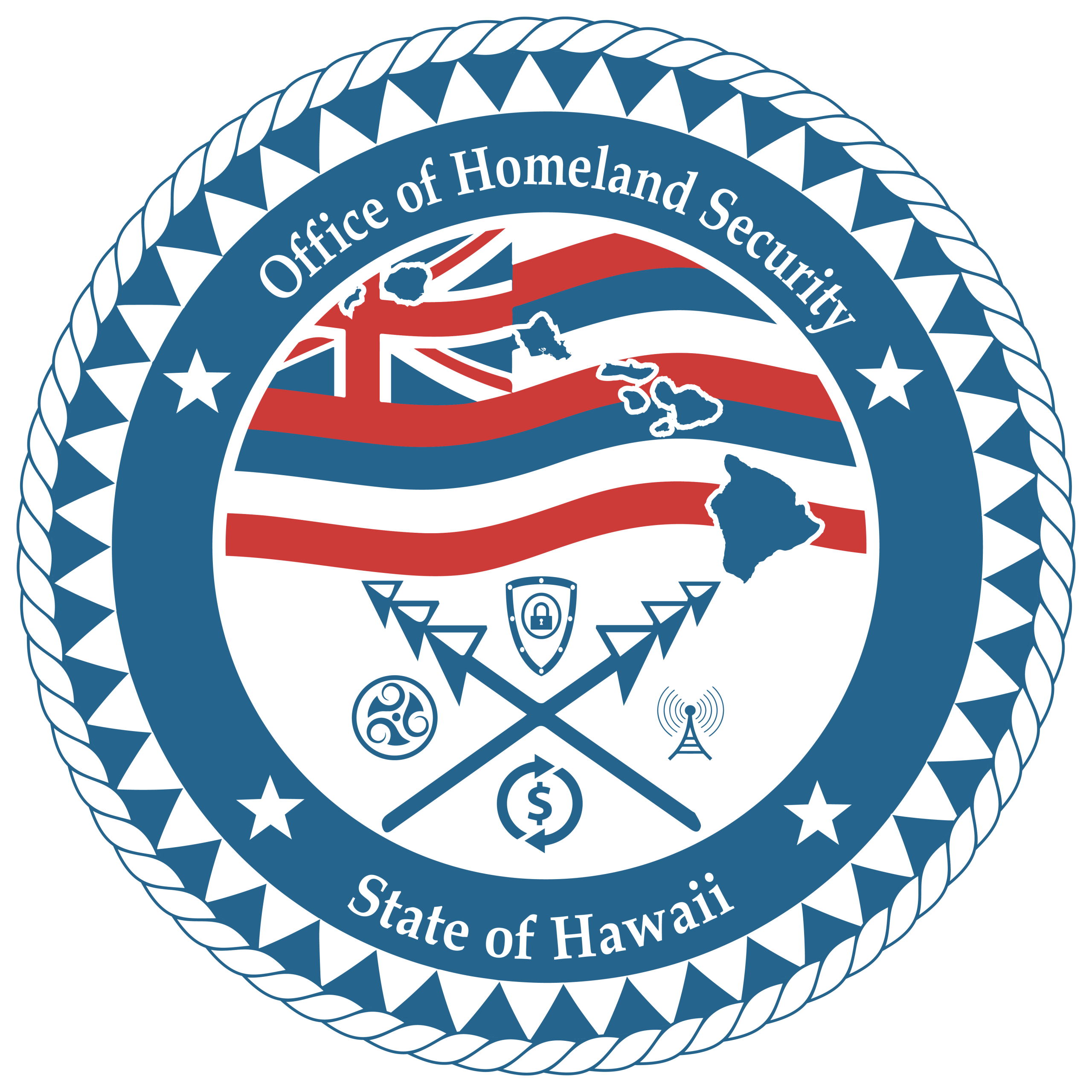Victim Protection Alerts
Check back here frequently for new and updated information on scams and schemes currently targeting victims of the Maui August wildfires.
Impersonating County, State, and Federal Officials
Criminals impersonating county, state, and federal officials use several different methods to scam people out of money or personal details that can be used to identity theft. Here are some things that government employees and law enforcement officers should never do:
- They should never ask you for personal information over the phone.
- They should never ask you to give them money for any reason.
- When in doubt, call the department or agency the person is claiming to be with and ask to confirm their identity.
Resources:
- Protection Tips for Kupuna
- Read About Law Enforcement Officer Impersonation Phone Scams
- Warning from the Social Security Administration on Credential & Badge Scams
- Read a Statement from the Public Safety Department About Sheriff Impersonations
- Honolulu Police Department’s List of Common Cyber Crimes
- Maui Police Department’s News Releases
Direct Cash Aid
Providing direct cash aid during the disaster has helped many of the impacted individuals and families. Whether you are providing or receiving cash aid, here are some tips and resources:
Providing Direct Cash Aid
- Your donation through peer-to-peer financial apps or websites like GoFundMe, Venmo, CashApp, PayPal, Zelle, etc are not covered by traditional consumer protections. If you believe the person or account you donated to is a scam or fraudulent, you will need to seek help through the company that facilitated the donation. You may still be eligible to file a complaint through the IC3.
- Carefully monitor your accounts after making a donation to ensure that the correct amount was donated, and that no other suspicious charges appear.
- Never share personal details like credit or debit card numbers, bank account numbers, or passwords/PINs
Receiving Direct Cash Aid
- Be extremely careful when sharing your personal details outside of peer-to-peer apps, including your phone number and home address.
- Don’t hold received money through apps; the Consumer Financial Protection Bureau explains why.
- Information from Nerd Wallet on Crowdfunding & Taxes
- Don’t share your bank account number(s)
- Be cautious when depositing personal checks
Resources
- Common Venmo Scams
- Common PayPal Scams
- Recognizing Suspicious E-mails and Scams on GoFundMe
- Avoiding Common CashApp Scams
- Zelle Fraud & Scams Page
Purchasing from Wishlists or Sending Gift Cards
Purchasing items from wishlists and sending gift cards to individuals and organizations have also helped many people during their time of need. Here are tips to ensure your donations are going to the right place, and to protect yourself:
- Ask the organization for their EIN, which can be used to look up their registration and annual reports online:
- If an organization or group has a vetting process, ask how the process is carried out.
- Treat gift cards like cash; once you purchase and provide them, there’s no way to get them back.
- Avoid anyone asking for gift cards or items to be purchased from personal wishlists; offer to make a donation in their name to a trusted charity instead.
- Avoid purchasing gift cards as fundraisers unless you are familiar with the charity/organization offering them.
Donating to New Non-Profits
- Ask the organization for their employer identification number (EIN). Every organization must have an EIN, even if it will not have employees. The EIN is a unique number that identifies the organization to the Internal Revenue Service. Read about the EIN here. Once you have been provided with an EIN, you can check to make sure the organization is registered and able to solicit donations in Hawai‘i through our Tax & Charities Division
- Use charity watchdog sites like the ones listed below, if you’d like to know how donations are being spent, and the percentage of donations that goes to servicing people.
- Charity Navigator
- Give.Org (Under the BBB)
- Charity Watch
- If you discover you’ve been scammed by a person or organization that is not a charity, please contact the:
- Donate by credit card or check; don’t give cash when possible
Facebook Scams & Schemes
If you think that a Facebook profile asking for direct donations is inauthentic or a scam, you can start by using this guide to reverse image searching on Google. If you find that the photos are being used on other websites or profile pages, chances are it’s a scam.
Instagram Scams & Schemes
A common scheme on Instagram is to replicate a popular or verified account in hopes of getting your personal information or money. This is often done by adding or removing a character or word from the account name, which is meant to mislead you into believing you found the correct account.
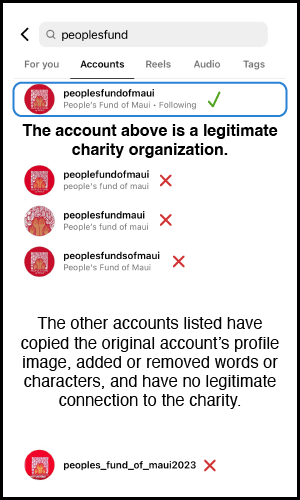
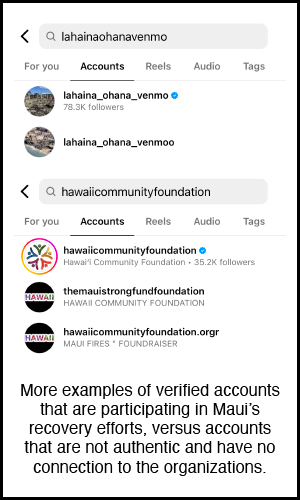
Direct Donation Scams & Schemes
Many victims were able to receive direct cash aid by posting some of their personal details and their unique Venmo QR code, so that others could easily scan the code and send money to them. Unfortunately, where there is help there is also harm. Your personal details, photos, and posts can be copied by scammers who then replace their own Venmo QR code onto the image, and share in order to solicit ‘donations’ that never make it into the hands of victims. Example:
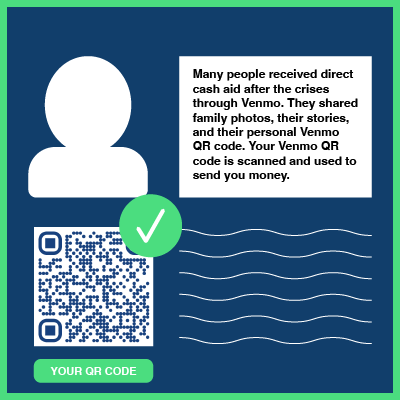
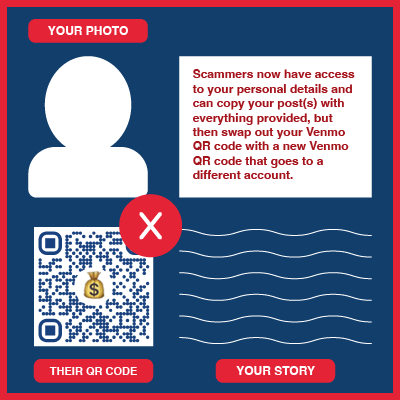
For Recipients
- If you find your images or story being used by someone else, report the post or the account on the platform where you found it.
- Don’t hold large sums of money inside cash-receiving apps like Venmo, CashApp, or Zelle. Here’s another article that explains why.
For Donors
- Be aware that there is no consumer protection for providing money to recipients through apps like Venmo, CashApp, Zelle, or PayPal.
- The only current and verified list of Venmo accounts related to the Maui 2023 crises are listed on this Instagram Account: Lahaina Ohana Venmo. This is a community-created and organized account; the State of Hawai‘i is not responsible for its contents and linking the group does not constitute endorsement.
- If you are unsure about accounts or posts that you see online, ask the organizer what their vetting process is like.
- Opt to donate to other charities providing direct financial aid to victims.
Using GoFundMe
- Verified Maui Wildfire GoFundMe Accounts
- Requesting a Refund
- Requesting a Donation Receipt
- Reporting a Fundraiser
- Avoiding Fraud & Schemes
False Sense of Legitimacy with Paid Verification
Almost all social media platforms have a procedure for providing verification for accounts that belong to celebrities, companies, elected officials, government organizations, and other prominent people/groups. Certain platforms that are now offering to provide users with a verification mark through a subscription service, in which the user pays for the platform to ‘verify’ them. The platform then promotes information posted by ‘verified’ accounts ahead of others, which has led to a cascade of mis-, dis-, and malinformation taking the spotlight. Read about how this happens and why it’s dangerous.
